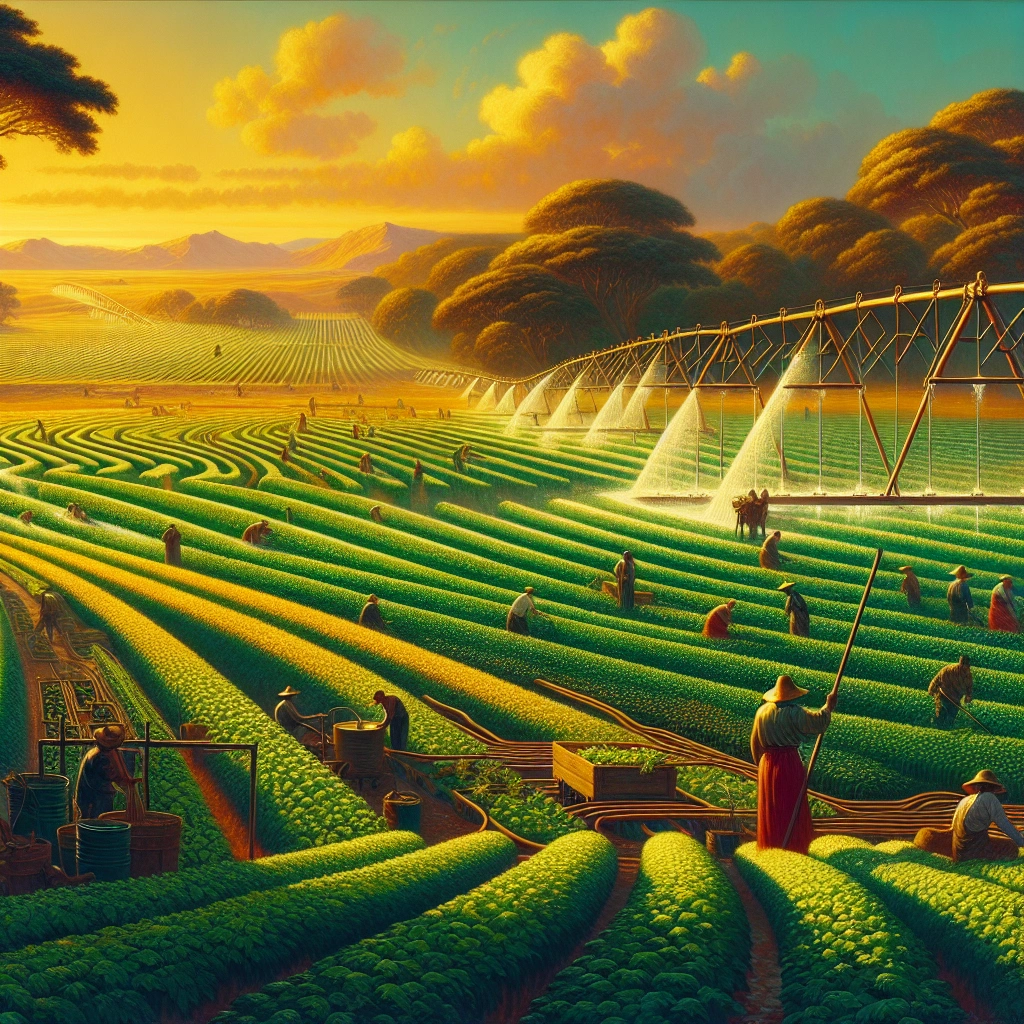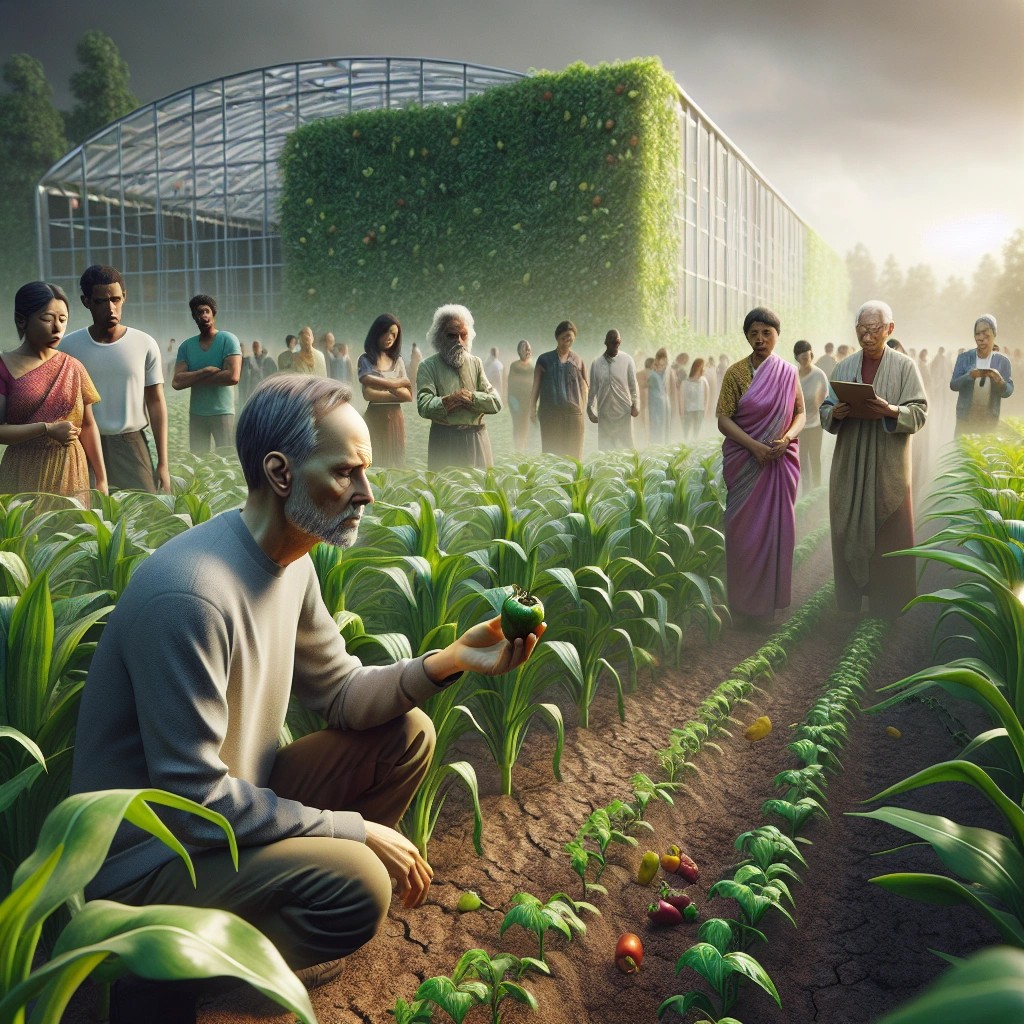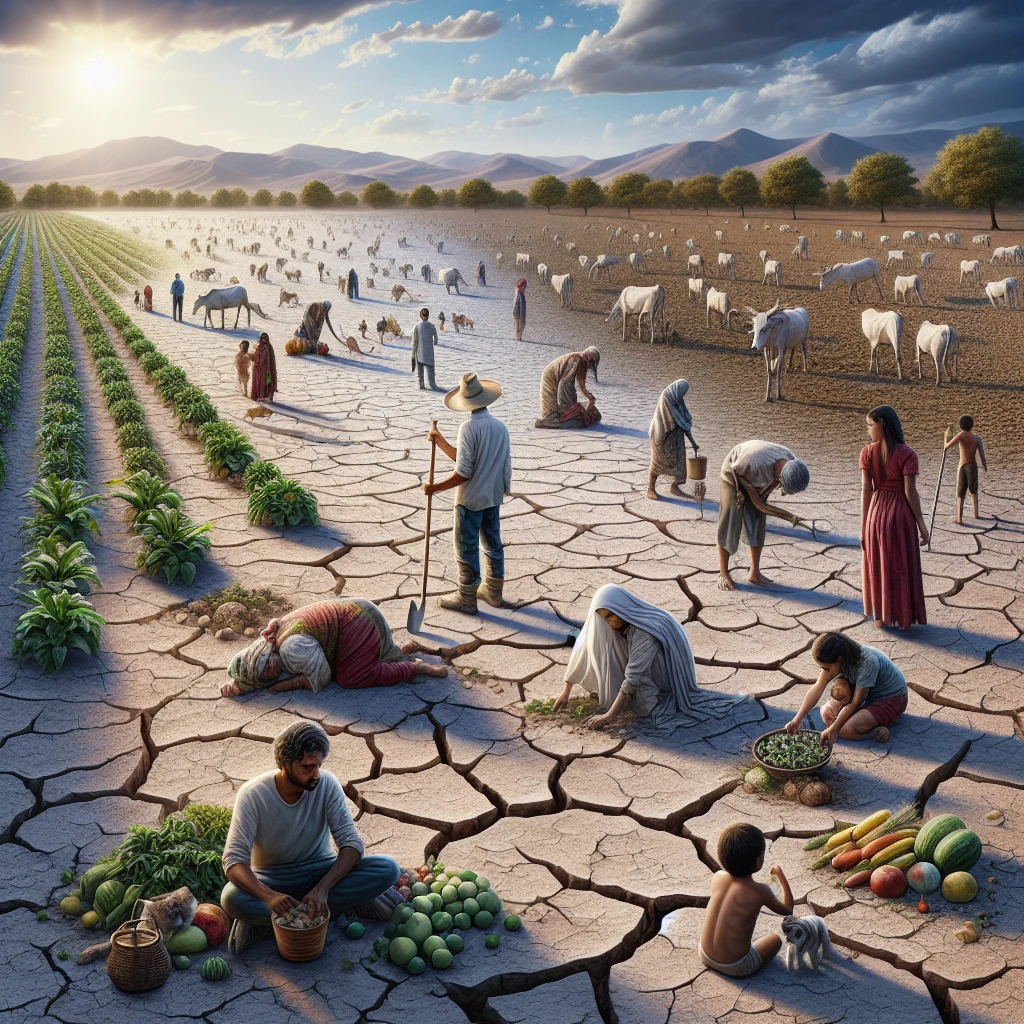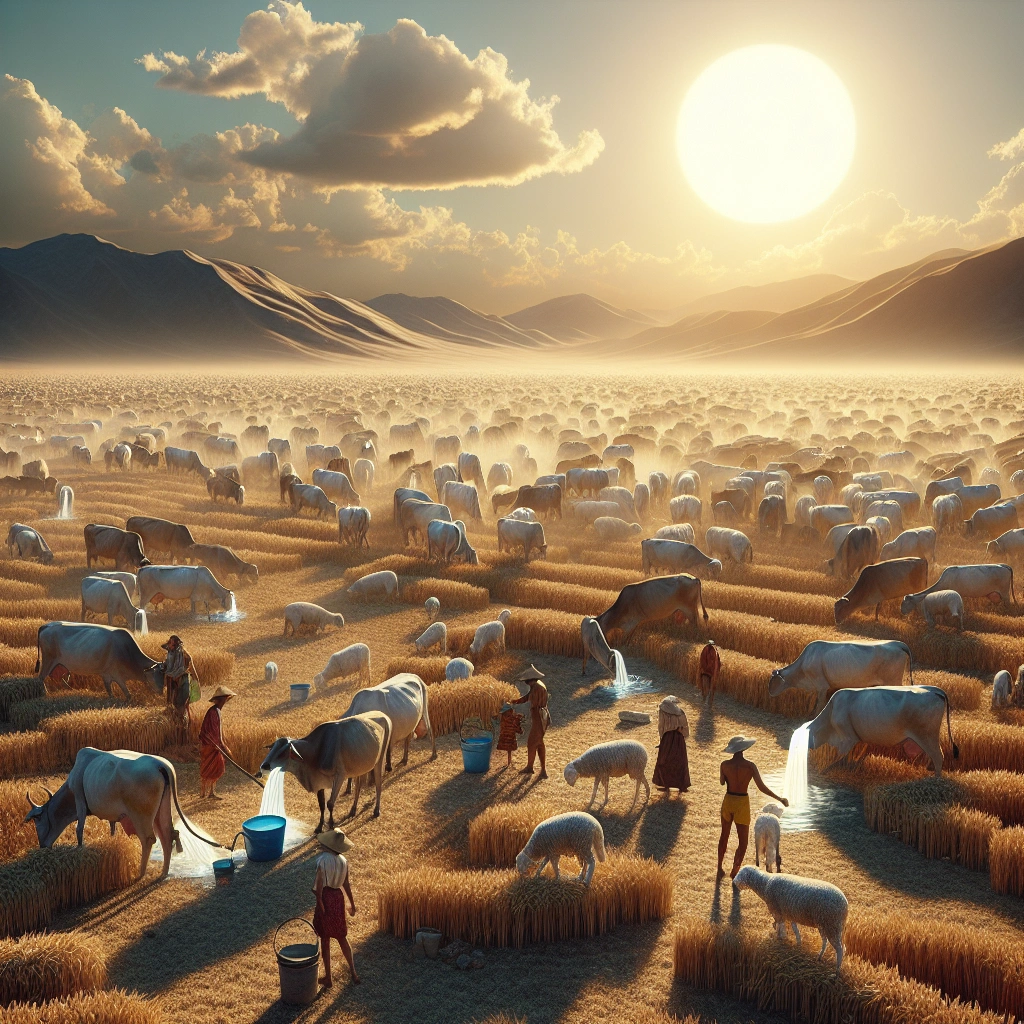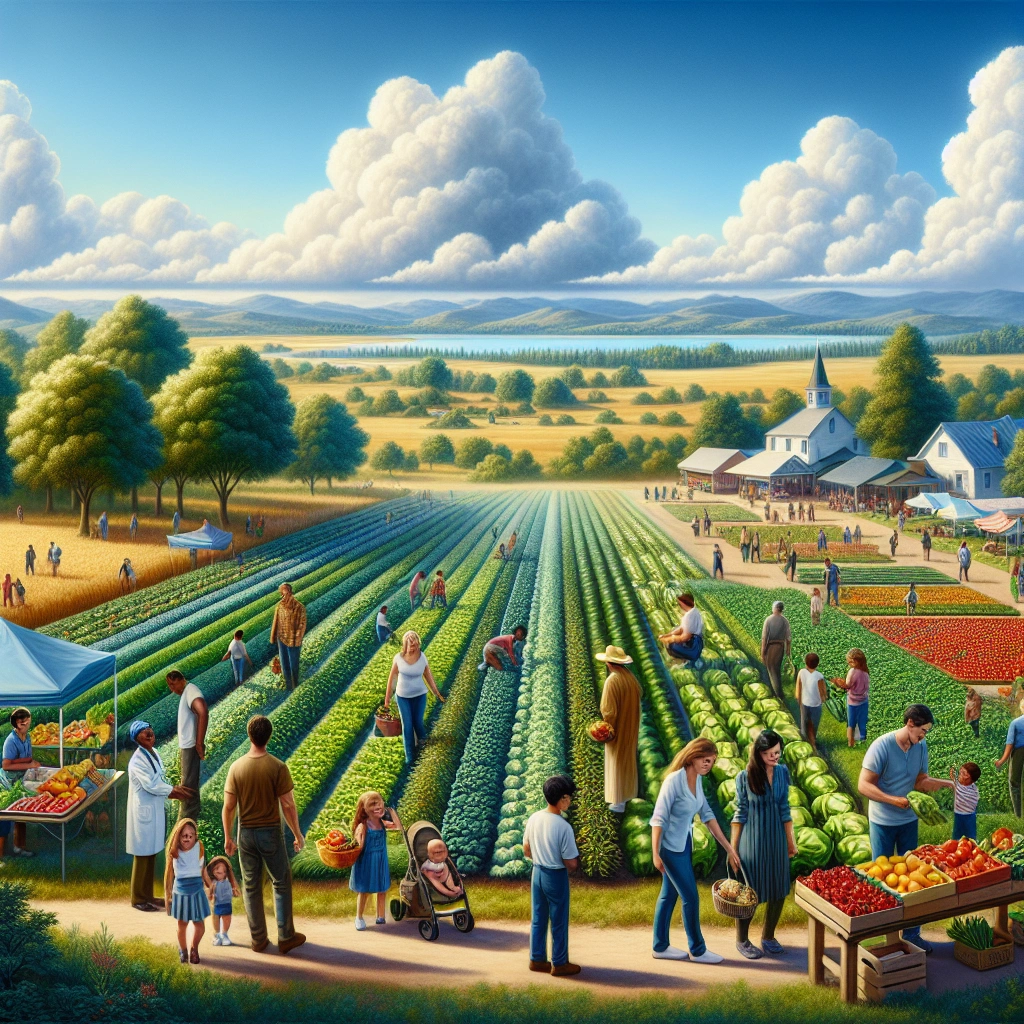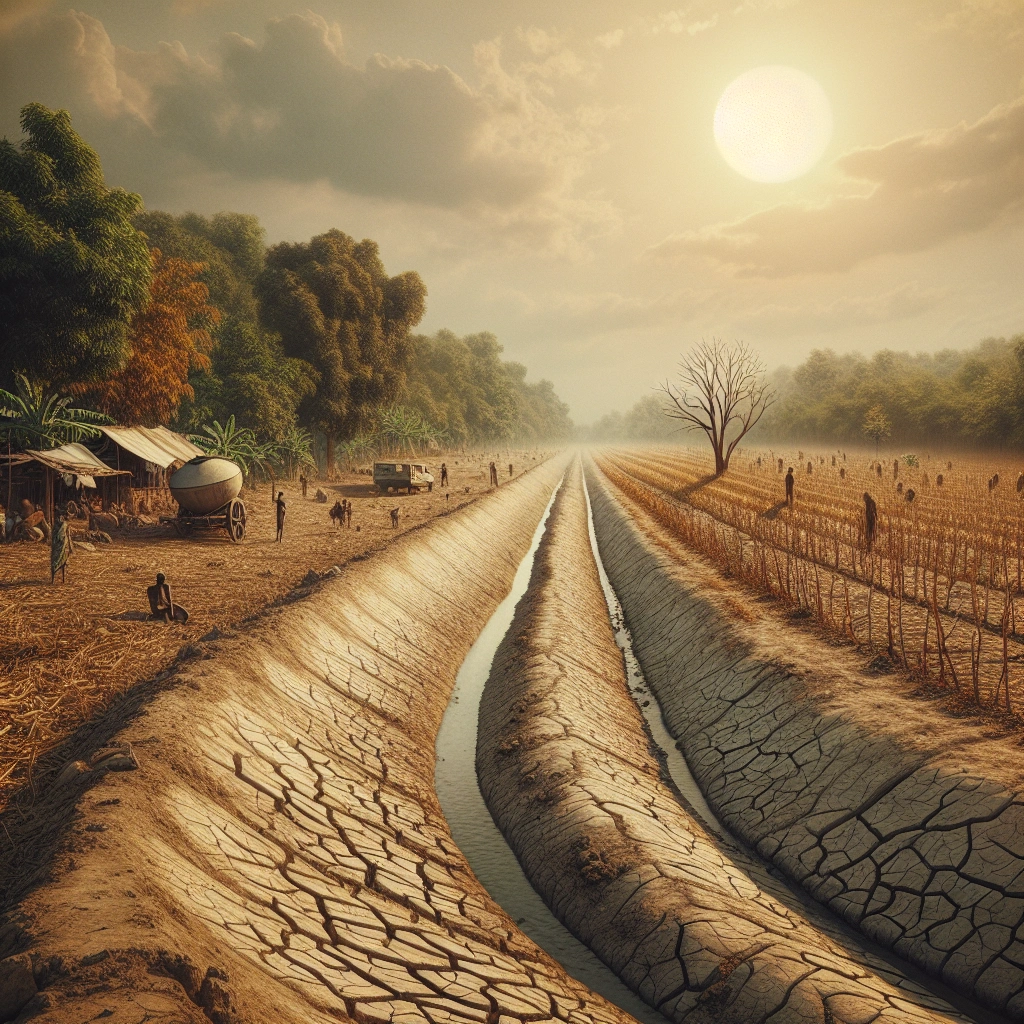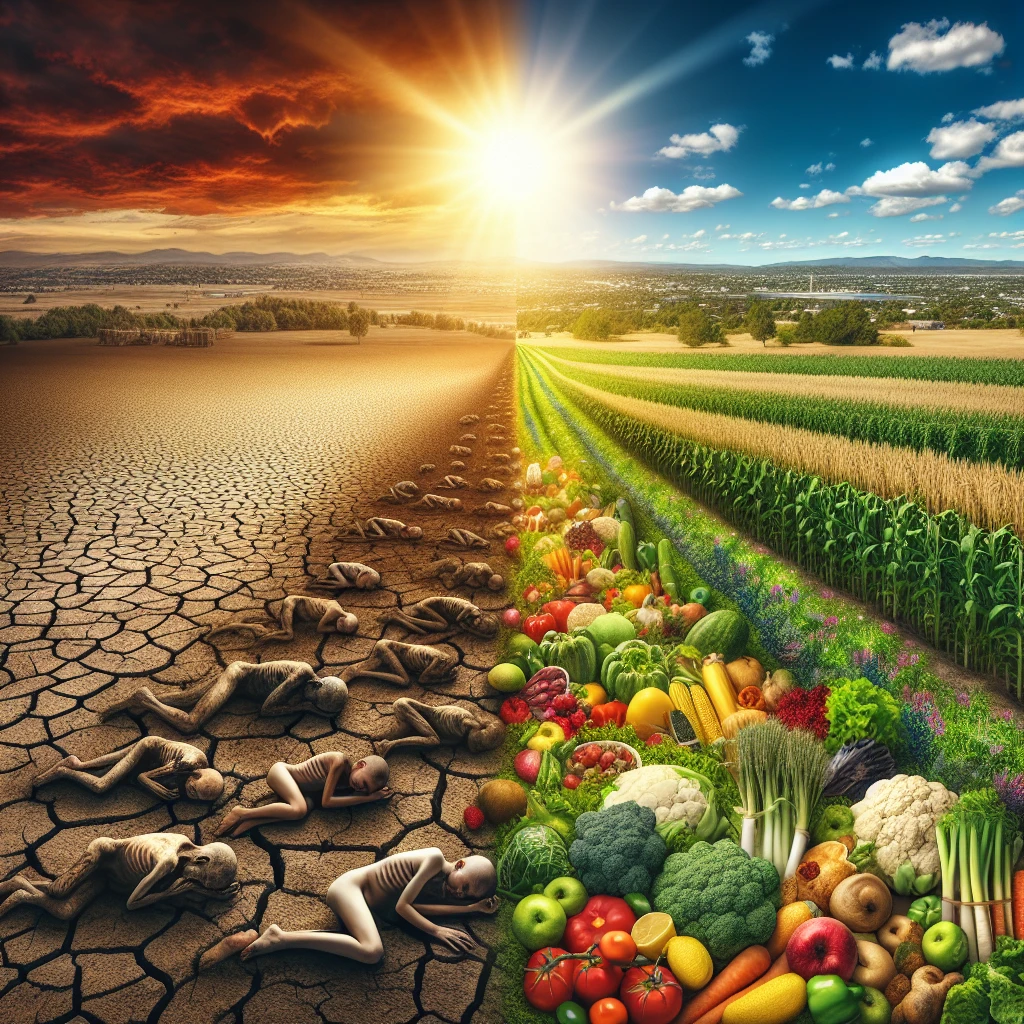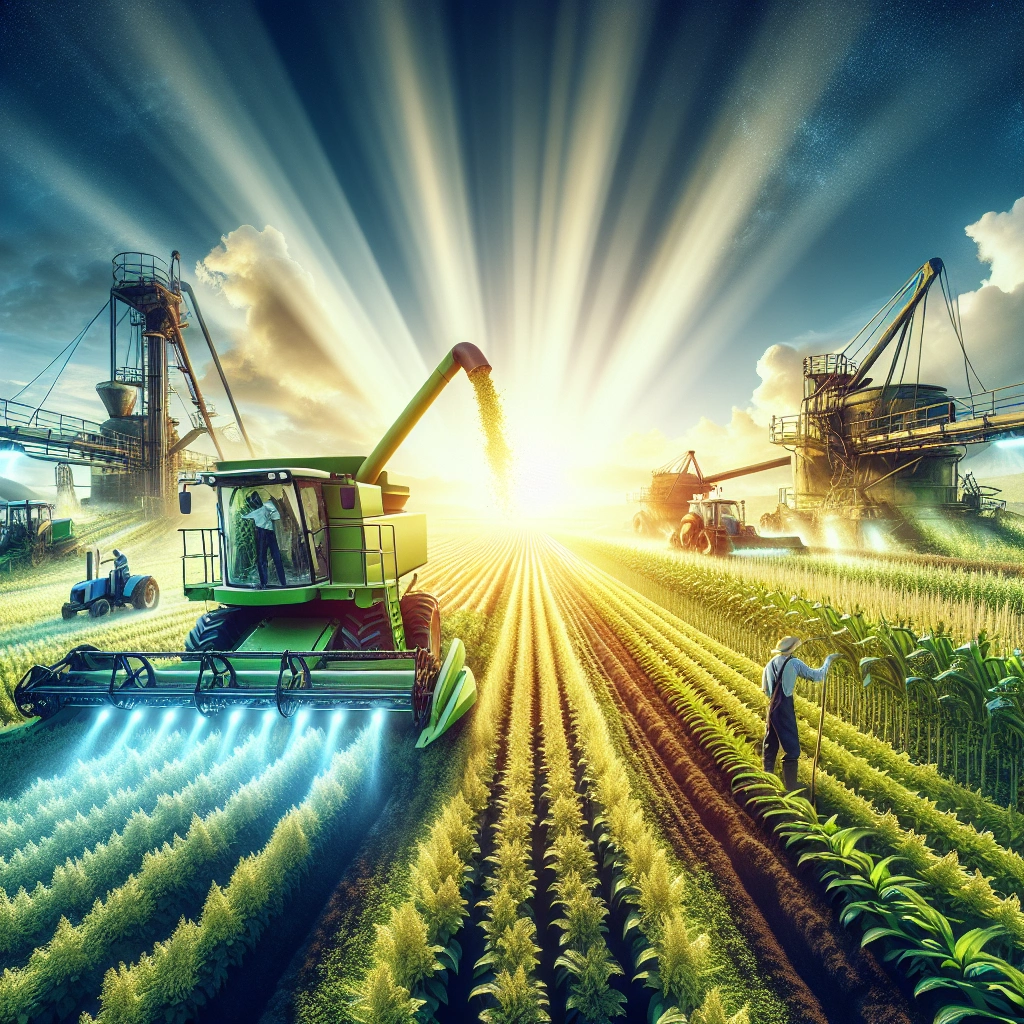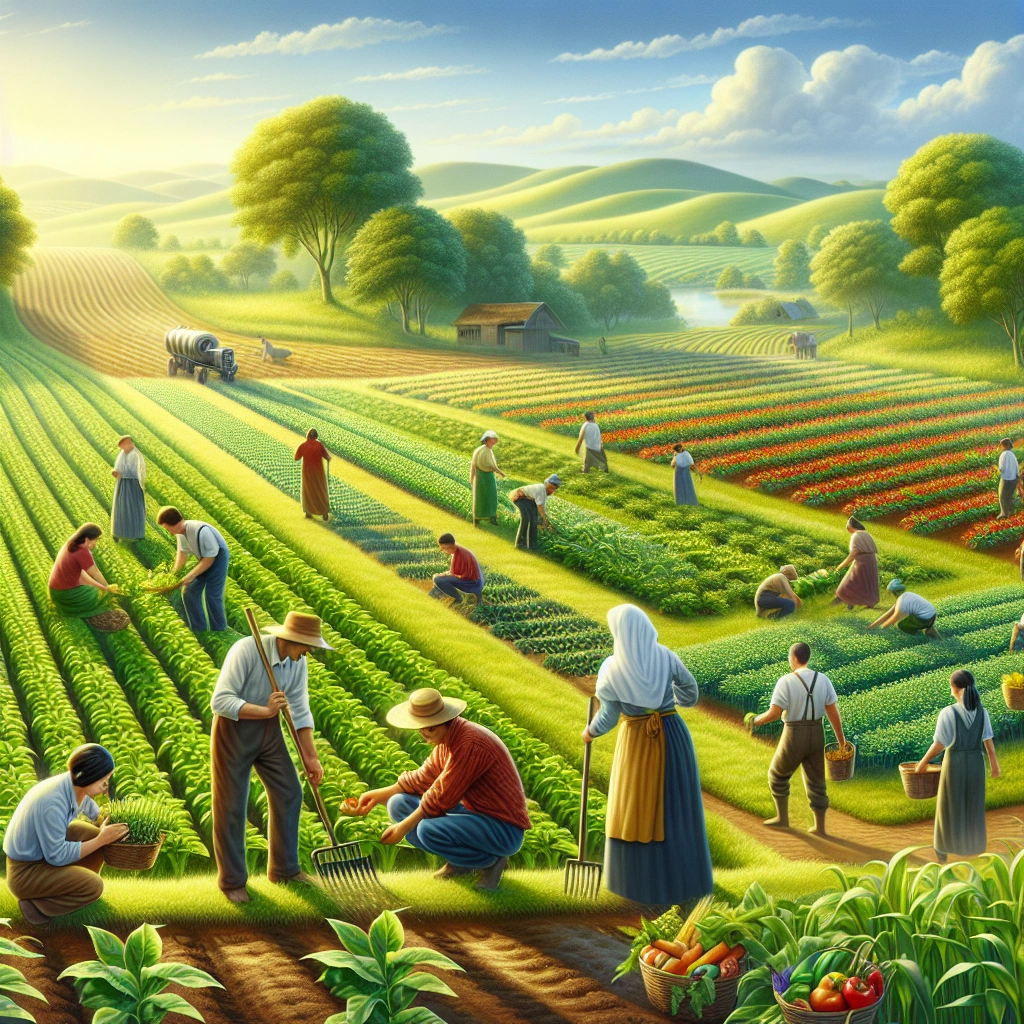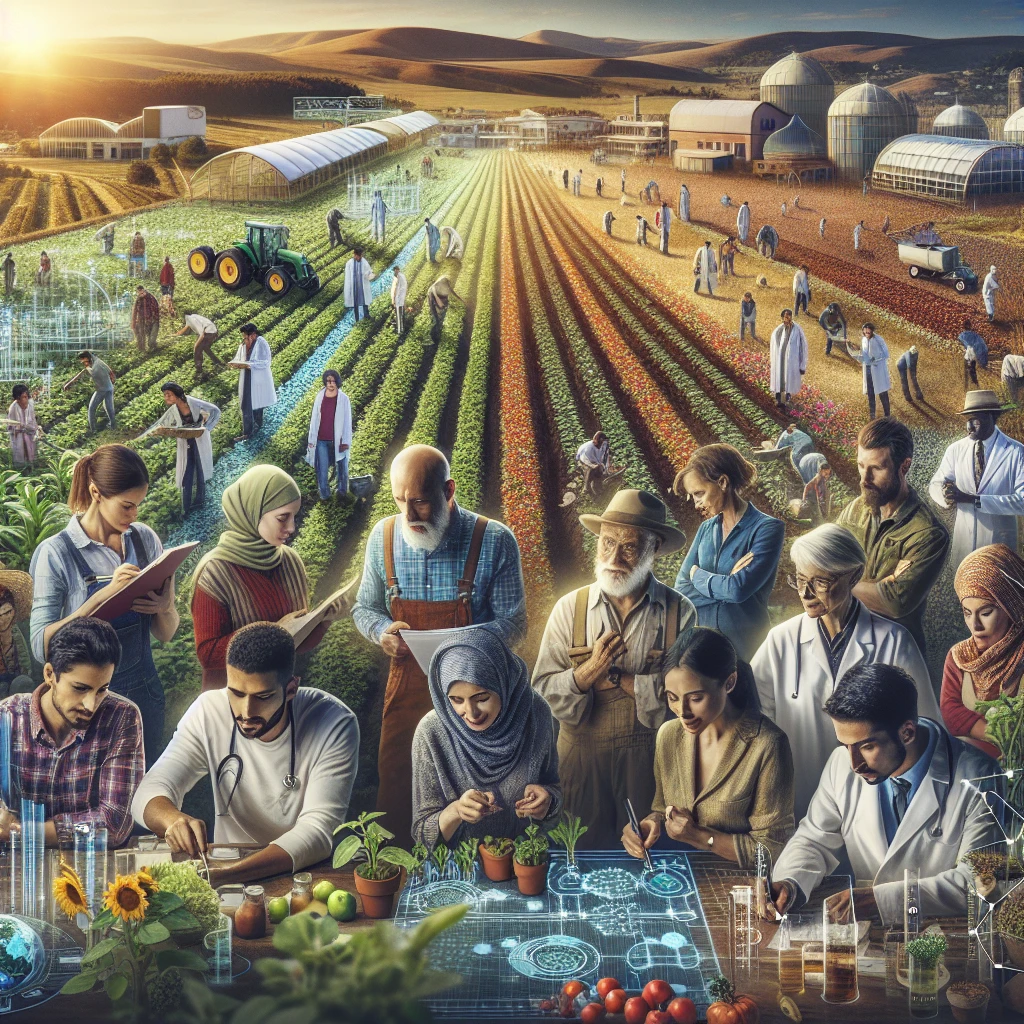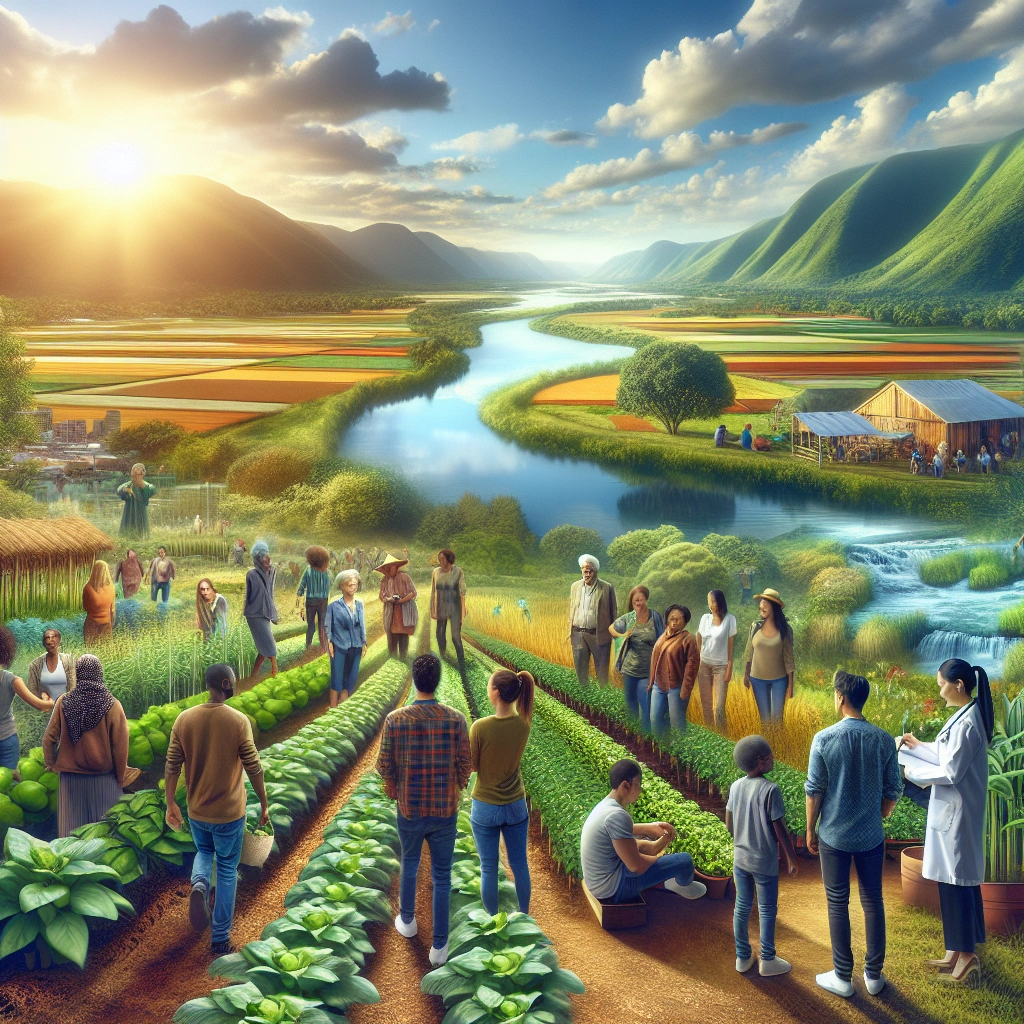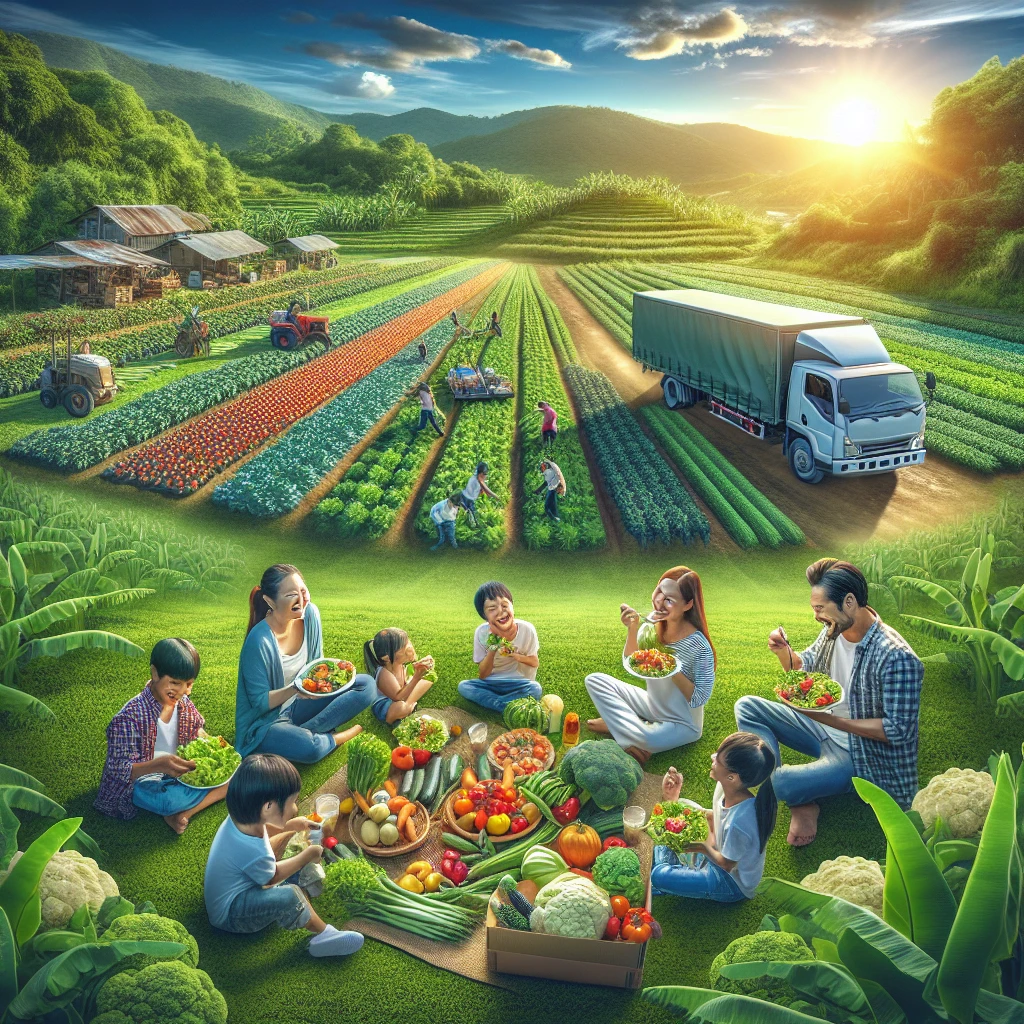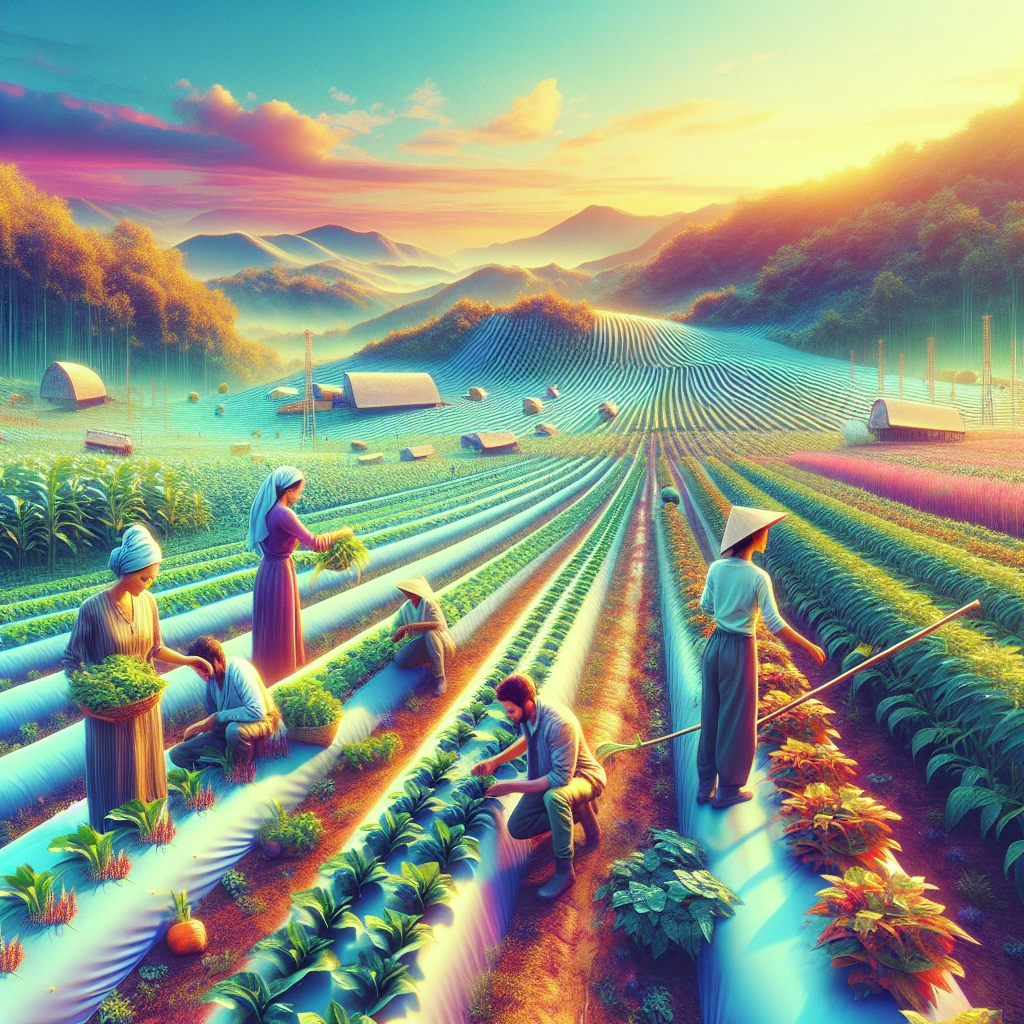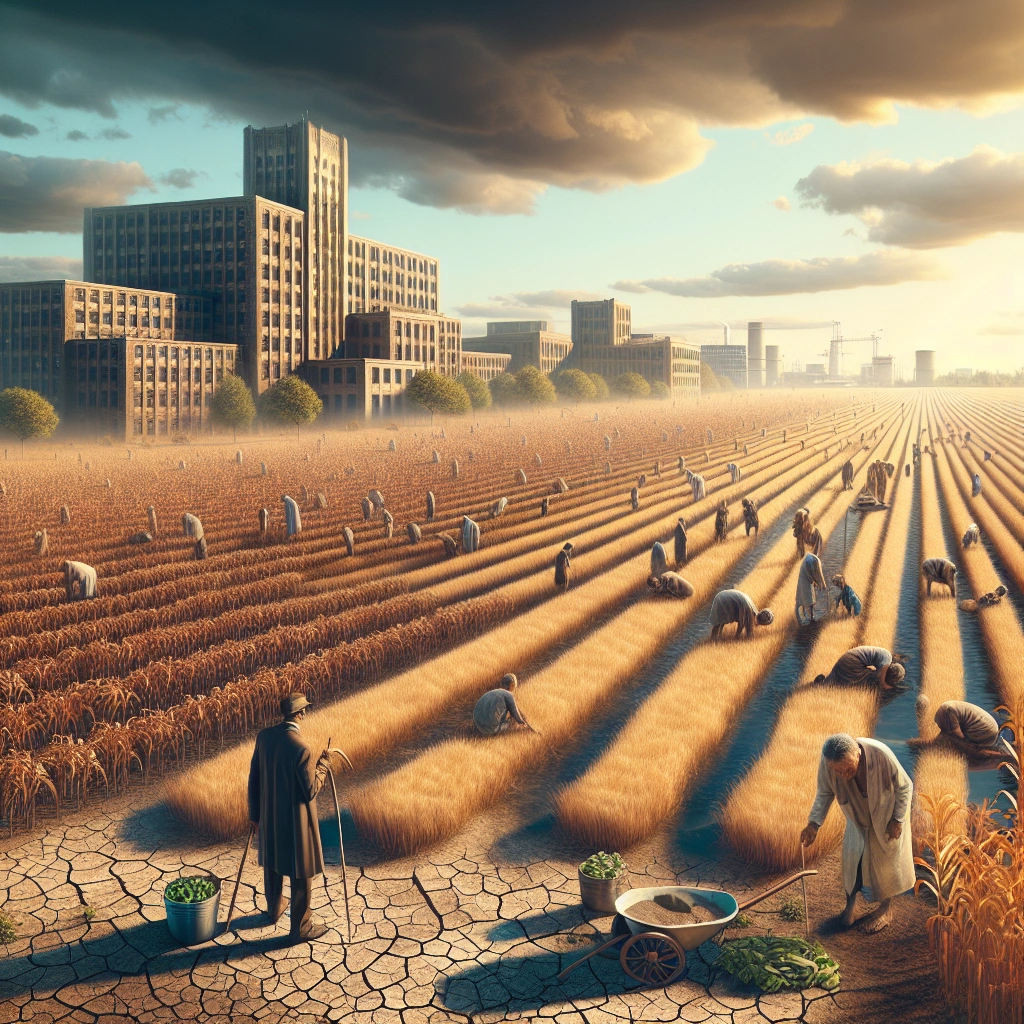

Climate change refers to long-term shifts in temperatures and weather patterns, which can have significant effects on food production and health. The way food is produced today contributes to about a third of greenhouse gas emissions, making it the number one source of methane and biodiversity loss.
Additionally, the impact of climate change on food systems, diet quality, and agricultural productivity can make it more difficult to grow crops and raise animals in the same ways and same places as we have done in the past. Climate change is expected to have a major impact on both food production and health.
Check out this Youtube video: “The impact of climate change on food security and nutrition” to learn about the projected effects of climate change on food production and health.
Impact on Crop Yield
Changes in temperature and precipitation
The changes in temperature and precipitation due to climate change have complex effects on crop yield. While rising temperatures and increased carbon dioxide concentration may enhance the yield of some crops, such as soybeans and sugarcane, the yields of major commodity crops like corn, rice, and wheat are expected to decrease significantly.
Additionally, more frequent and extreme weather events like heavy precipitation and droughts can harm crops, leading to reduced yields and affecting food production.
Effects on crop growth and yield
Climate change poses significant challenges to maintaining and improving crop production globally. Warmer temperatures and elevated carbon dioxide levels impact crop yields, leading to potential decreases in maize yields by up to 24% and increases in wheat yields by about 17%.
These changes in crop yields directly affect food availability, potentially disrupting food security and access to essential nutrition.
Risks to food security
The projected effects of climate change on crop yield and food production pose severe risks to global food security. It is estimated that about 80% of the global population is most at risk of crop failures and hunger due to climate impacts.
The number of people suffering from acute food insecurity has been on the rise, with supply chain disruptions and economic fallout contributing to food price increases. Climate change intensifies these risks, threatening to reverse progress in the fight against hunger and malnutrition.
Changes in Agricultural Practices
Adoption of new farming techniques
New farming techniques have revolutionized modern agriculture, leading to increased productivity, sustainability, and efficiency. For example, precision agriculture employs advanced technologies like robots, temperature and moisture sensors, and GPS, allowing for more precise and environmentally friendly practices.
Additionally, regenerative farming, data-powered decision-making, and vertical farming are transforming the industry, enabling farmers to optimize yields and resource usage. These innovative techniques are reshaping the future of farming, ensuring greater food security and resilience in the face of climate change.
Shifts in planting and harvesting seasons
Climate change has necessitated shifts in planting and harvesting seasons to adapt to changing weather patterns. With earlier springs and extended growing seasons, farmers are now able to plant longer-maturing crops and increase agricultural yields.
For instance, many farmers have modified their planting practices in response to warmer temperatures, resulting in increased production. Although seasonal shifts present challenges, they also offer opportunities for greater agricultural output and forest growth in various regions.
These adjustments are crucial in ensuring food security amidst climatic uncertainties.
Impacts on traditional farming methods
The adoption of modern agricultural techniques has significantly impacted traditional farming methods, bringing about substantial increases in crop yields per arable land. However, traditional farming methods, while deeply ingrained in agricultural history, have also contributed to environmental degradation.
Deforestation, water overuse, and greenhouse gas emissions are among the environmental impacts associated with traditional agriculture. As the industry moves towards sustainability, emphasis is placed on minimizing environmental harm through the reduction of chemicals, preservation of biodiversity, and soil health improvement.
Modern agriculture is striving to find a balance between innovation and environmental conservation, securing a sustainable future for both food production and the planet.
| Traditional Farming | Modern Agriculture |
|---|---|
| Contributes to deforestation, water overuse, and greenhouse gas emissions | Involves advanced technologies like precision agriculture and smart irrigation for enhanced sustainability and efficiency |
| Has a historical significance | Is focused on optimization of yields and environmental conservation |
Food Quality and Safety
Effects of climate change on food quality
Climate change can significantly impact the quality of food by altering the nutrient content and overall composition of crops. Rising temperatures and changing precipitation patterns can lead to a decrease in nutrient density in staple crops like rice and wheat, affecting the overall nutritional value of these essential food sources. Additionally, climate change can influence the taste, texture, and appearance of fruits and vegetables, potentially compromising the sensory quality that consumers expect.
Increased risk of contamination and spoilage
The increased frequency of extreme weather events such as floods and heatwaves poses a significant risk of contamination and spoilage in food products. Floods can lead to the contamination of crops with pollutants, and higher temperatures can accelerate the spoilage of perishable goods, leading to food wastage. This heightened risk can compromise food safety and consumer health, requiring stricter monitoring and safety measures throughout the food supply chain.
Impact on foodborne illnesses
Climate change can exacerbate the prevalence of foodborne illnesses by creating favorable conditions for the growth and spread of pathogens. Changes in weather patterns can impact the behavior of bacteria, viruses, and parasites, leading to an increased risk of contamination in food products. Additionally, extreme weather events can disrupt food production and distribution, potentially compromising the safety protocols and increasing the likelihood of foodborne outbreaks.
| Climate Change Impact | Description |
|---|---|
| Contamination Risk | Increase in contamination due to extreme weather events like floods and heatwaves |
| Spoilage Risk | Heightened risk of food spoilage and wastage due to rising temperatures |
| Pathogen Growth | Favorable conditions for pathogen growth, leading to increased risk of foodborne illnesses |
The projected effects of climate change on food production and health are substantial, requiring proactive measures and adaptation strategies to ensure the continued availability of safe and nutritious food for global populations.
Nutrition and Health Implications
Changes in availability of nutritious food
The projected effects of climate change on food production and health will lead to significant changes in the availability of nutritious food. With extreme weather events and changing temperature patterns, crop yields may be adversely affected, leading to reduced availability of fresh produce and essential nutrients.
This can result in limited access to fresh fruits, vegetables, and other healthy food options, potentially impacting dietary diversity and overall nutrition.
Effects on public health
The repercussions of climate change on food production will directly impact public health. Reduced access to nutritious food can increase the prevalence of diet-related health issues such as malnutrition, obesity, and chronic diseases.
This poses a significant threat to public health as nutritional deficiencies and imbalances can contribute to a higher burden of non-communicable diseases, affecting the overall well-being of communities and populations.
Risks of malnutrition and related health issues
The potential risks of malnutrition and related health issues stemming from climate change-induced food production challenges are immense. Malnourishment, deficiencies in essential nutrients, and inadequate dietary intake can lead to a host of health complications, including impaired growth and development, weakened immune systems, and heightened susceptibility to various illnesses and infections.
These risks highlight the critical need for proactive measures to mitigate the adverse impact of climate change on food security and public health.
| Effects | Example |
|---|---|
| Malnutrition | Reduced access to fresh produce leading to micronutrient deficiencies |
| Obesity | Limited availability of nutritious food options contributing to unhealthy dietary patterns |
| Chronic Diseases | Increased prevalence of diet-related health issues impacting overall community well-being |
Water Scarcity and Irrigation Challenges
Decreased water availability for agriculture
The decreased water availability for agriculture due to climate change has led to significant challenges in crop production and livestock farming. This scarcity directly impacts the growth and health of agricultural products, reducing the overall food production capacity.
For instance, in regions experiencing prolonged droughts, the lack of water availability affects the irrigation of crops and watering of livestock, ultimately leading to reduced yields and lower productivity. This shortage of water hampers the ability of farmers to sustainably produce food, resulting in potential economic losses and food insecurity.
Impacts on irrigation systems
The impacts of water scarcity on irrigation systems are profound, posing significant challenges to efficient water distribution and utilization for agriculture. Scarce water resources limit the amount of water that can be allocated for irrigation, leading to lower crop yields, increased susceptibility to drought, and overall reduced productivity in the agricultural sector.
In recent years, technologies such as gravity, sprinkler, and micro-irrigation have been increasingly modified to enhance efficiency and conserve water, yet the overall impact remains substantial.
Potential for conflicts over water resources
The limited availability of water resources has led to potential conflicts over water, particularly in regions heavily reliant on agriculture. Factors such as population growth, climate change, and economic expansion intensify these conflicts, as access to sufficient water for irrigation becomes increasingly scarce.
This situation not only poses challenges for farmers but also raises concerns about geopolitical tensions and social instability arising from water-related disputes. Addressing these conflicts and ensuring equitable water distribution is crucial for sustaining agricultural activities and promoting food security.
| Countries | Implications | Action Required |
|---|---|---|
| Developing Nations | Severe impact on food production, potential risk of food insecurity | International cooperation and aid for sustainable water management |
| Arid Regions | Increased vulnerability to drought, reduced agricultural productivity | Implementation of water conservation policies and advanced irrigation technologies |
Water scarcity poses significant challenges to agriculture, impacting food production and health. Addressing these challenges requires a comprehensive approach, including the implementation of efficient water management strategies and the adoption of technologies to enhance irrigation systems.
By prioritizing sustainable practices and international collaboration, it is possible to mitigate the projected effects of climate change on food production and ensure a more secure future for agriculture.
Impact on Livestock and Animal Products
The projected effects of climate change on food production and health have significant implications for livestock and animal products.
Effects on animal health and productivity
Climate change, particularly the increase in temperatures and frequency of heat waves, poses significant risks to animal health and productivity. Heat stress can lead to metabolic disruptions, oxidative stress, immune suppression, and increased susceptibility to infections, ultimately impacting the overall well-being and productivity of livestock.
Risks to meat, dairy, and other animal products
The risks to meat, dairy, and other animal products are substantial due to climate change. Reduced availability, compromised quality, and safety concerns due to contamination with pathogens or pesticides are key challenges facing the livestock food supply chain.
Additionally, the altered environmental temperature and humidity can directly impact the consistency of nutrient ingredients in animal feed, further affecting the quality of animal products.
Implications for global protein supply
The implications of climate change for the global protein supply are profound. The production of red meats contributes significantly to greenhouse gas emissions, exacerbating global warming.
Moreover, as atmospheric carbon dioxide levels rise, the nutritional value of crops diminishes, posing a threat to global protein supply. This coupled with the impact on agricultural productivity and food availability underscores the urgency of addressing climate change to ensure a sustainable global protein supply.
| Factors | Implications |
|---|---|
| Heat stress | Metabolic disruptions, oxidative stress, immune suppression |
| Quality and safety | Contamination with pathogens or pesticides |
| Nutrient consistency | Impact on animal feed quality and product quality |
Economic and Social Disparities
Differential impacts on different regions and communities
The projected effects of climate change on food production and health will have variable impacts on different regions and communities. For example, regions reliant on agriculture as a primary source of income will face significant challenges due to changes in precipitation patterns and extreme weather events.
Coastal communities will also be disproportionately affected by rising sea levels and increased storm intensity, impacting seafood availability and livelihoods.
Potential for exacerbating food insecurity and poverty
Climate change has the potential to exacerbate food insecurity and poverty, particularly in vulnerable regions. Shifts in temperature and precipitation patterns can lead to reduced crop yields and livestock production, leading to increased food prices and limited access to nutritious food.
Additionally, extreme weather events can disrupt food supply chains, further impacting the availability of affordable and diverse food options, thereby intensifying the struggle faced by economically disadvantaged populations.
Challenges for vulnerable populations
Vulnerable populations, such as low-income communities and marginalized groups, will face significant challenges due to the projected effects of climate change on food production and health. These challenges include reduced access to essential nutrients, heightened risk of malnutrition, and increased susceptibility to foodborne illnesses.
Additionally, already marginalized groups may experience amplified economic and social disparities, creating further barriers to accessing adequate and nutritious food options.
Public Health Policies and Interventions
Strategies to mitigate the effects of climate change on food production and health
Implementing sustainable agricultural practices, such as crop diversification and conservation tillage, can enhance resilience to climate change. For example, promoting the use of drought-resistant crop varieties and integrated pest management can mitigate the adverse impacts of extreme weather events on food production.
Importance of government and international efforts
Government and international efforts are crucial in addressing the ramifications of climate change on food production and health. Policy interventions focused on reducing greenhouse gas emissions and investing in climate-smart agriculture are imperative to safeguarding global food security.
Role of public health organizations and initiatives
Public health organizations play a pivotal role in advocating for policies that address the health implications of climate change. They are instrumental in conducting research, raising awareness, and implementing programs to mitigate the adverse effects of environmental shifts on public health.
Climate Change Adaptation and Resilience
Importance of building resilience in agricultural systems
Building resilience in agricultural systems is crucial to adapt to the effects of climate change on food production and health. It involves implementing practices that can withstand extreme weather events, such as droughts, floods, and heatwaves, which are becoming more frequent due to climate change.
For example, adopting drought-resistant crop varieties, improving water management, and implementing soil conservation techniques can contribute to building resilience in agricultural systems.
Adoption of sustainable practices
The adoption of sustainable practices in agriculture is essential for mitigating the projected effects of climate change on food production and health. Practices such as regenerative agriculture, crop rotation, organic farming, and carbon farming can help reduce greenhouse gas emissions, improve soil health, and enhance crop resilience.
By integrating these sustainable practices, farmers can contribute to a more sustainable and resilient food production system, thereby positively impacting public health.
Integration of climate change considerations into food and health policies
Integrating climate change considerations into food and health policies is necessary to address the projected effects of climate change on food production and health. This integration involves developing policies that promote sustainable food systems, support climate-resilient agricultural practices, and prioritize nutrition and food security.
By incorporating climate change considerations into policies, governments and organizations can address the challenges posed by climate change on food production and public health effectively.
Global Food Trade and Supply Chain Disruptions
Effects on food prices and availability
The disruptions in global food trade and supply chain have led to significant effects on food prices and availability. Countries implementing food export bans and limiting measures have caused a spike in food prices, making it challenging for people, especially vulnerable populations, to access affordable and nutritious food. This has resulted in increased food insecurity and malnutrition, further impacting the overall availability of food in the global market.
Risks of disruptions in global food trade
The risks associated with disruptions in global food trade are substantial. Factors such as supply chain strains, climatic events, and trade and biofuel policies have contributed to soaring food prices, posing a critical risk to the stability of the global food market. Converging disruptions, such as the non-renewal of the Black Sea Grain Initiative and new food export restrictions, have tightened supply conditions and triggered price pressures, intensifying the vulnerabilities within the global food trade.
Implications for food security and access
The disruptions in global food trade have profound implications for food security and access. Even a slight disruption in the food supply can significantly disturb global food prices and societies’ abilities to cope with them, leading to heightened food insecurity. Moreover, the ongoing disruptions have further limited the accessibility of food, causing human suffering, particularly for the most vulnerable populations, and exacerbating the global food shortage and security risks.
Addressing Climate Change Through Dietary Choices
Potential for reducing environmental impact through dietary changes
Dietary changes have the potential to significantly reduce environmental impact. For example, reducing consumption of meat and dairy products can lower carbon footprint, as these food items tend to have a higher environmental impact.
By embracing more plant-based diets, individuals can contribute to reducing greenhouse gas emissions and minimizing the demand for environmental resources. By shifting towards sustainable and eco-friendly food options, we can collectively make a substantial impact on the environment.
Importance of sustainable food consumption
Sustainable food consumption is crucial for mitigating the effects of climate change. It involves making conscious choices such as opting for locally grown produce, reducing food waste, and embracing plant-based diets.
By prioritizing sustainable food consumption, individuals can play a pivotal role in promoting environmental conservation and reducing their carbon footprint. This approach fosters a healthier relationship between individuals and the environment, ensuring the well-being of both parties for the future.
Role of individuals in addressing climate change through food choices
Individuals play a pivotal role in addressing climate change through their food choices. By making conscious decisions to support sustainable and eco-friendly options, they contribute to reducing greenhouse gas emissions and protecting the planet’s resources.
This includes embracing plant-based diets, supporting local farmers, and minimizing food wastage. Every small decision regarding food consumption can collectively lead to significant positive impacts on the environment and overall global sustainability.
| Potential Reductions Through Dietary Changes |
|---|
| – Lower carbon footprint |
| – Reduced greenhouse gas emissions |
| – Minimized environmental resource demand |
All in all, embracing sustainable dietary choices is not just beneficial for personal health, but also for the health of our planet. By making mindful decisions about what we consume, we can actively contribute to environmental conservation and combat the adverse effects of climate change.
Technology and Innovation in Agriculture
Role of technology in mitigating climate change impacts
Technology plays a crucial role in mitigating the impacts of climate change on agriculture. Sophisticated sensors and precision agriculture techniques allow farmers to monitor soil conditions, track crop health, and optimize resource usage.
Additionally, advancements in cloud computing, artificial intelligence, and IoT enable the capture of carbon dioxide, reducing greenhouse gas emissions. These technologies contribute to sustainable farming practices, promoting environmental conservation while enhancing productivity.
Advancements in agricultural and food production technologies
Innovative technologies have revolutionized agricultural and food production practices. Modern farming integrates robotics, temperature sensors, aerial imagery, and GPS technology to streamline operations.
Moreover, indoor vertical farming, precision agriculture, and livestock technology have emerged as key trends, promoting efficiency, sustainability, and environmental friendliness. These advancements enhance agricultural productivity, ensuring more profitable and environmentally responsible farming practices.
Importance of innovation in addressing food security challenges
Innovation plays a pivotal role in addressing food security challenges. Through regenerative methods, vertical farming, and industrialization, agriculture can meet the growing demand for food sustainably.
Cutting-edge technologies such as biofortification, precision agriculture, and early warning systems offer solutions to mitigate food instability while enhancing nutritional value. Embracing agribusiness innovation and emerging production technologies fosters global food security and rural livelihoods.
| Agriculture Innovations | Benefits |
|---|---|
| Precision Agriculture | Enhances efficiency and sustainability in farming practices |
| Indoor Vertical Farming | Promotes resource optimization and sustainable food production |
| Livestock Technology | Improves livestock management and contributes to food security |
| Biofortification | Enhances nutritional value of food, addressing food insecurity |
| Regenerative Methods | Promotes sustainable agriculture and supports global food security |
Technology and innovation have amplified the resilience of agriculture in the face of climate change, fostering sustainable practices and addressing food security challenges. From precision agriculture to biofortification, these advancements empower farmers to navigate climate impacts and meet global food demands effectively.
Education and Awareness on Climate-Resilient Food Practices
Importance of educating farmers and stakeholders
Educating farmers and stakeholders is crucial in building climate resilience within food production systems. By providing knowledge on sustainable agricultural practices, the community can mitigate the adverse effects of climate change on crop yields and incomes.
For example, educating farmers on diverse cropping systems and water conservation techniques can help them adapt to changing climate patterns and ensure a consistent food supply.
Role of public awareness campaigns
Public awareness campaigns play a pivotal role in promoting climate-resilient food practices. By disseminating information about the impact of climate change on food production and health, these campaigns empower consumers to make informed choices.
For instance, educating the public about local agricultural products fosters consumer knowledge and drives demand, ultimately supporting climate-resilient food production and consumption.
Promoting climate-resilient food production and consumption
Promoting climate-resilient food production and consumption involves integrating sustainable farming practices that prioritize environmental and human health. For example, investing in rural infrastructure, clean energy capabilities, and scientific research aligns with the goal of building more sustainable, resilient, and inclusive food systems.
Additionally, public and private sector partnerships are essential in implementing climate-smart agriculture and forestry strategies, driving momentum towards climate-resilient food practices.
Collaboration and Partnerships for Climate Resilience
Importance of collaboration between governments, organizations, and communities
Collaboration between governments, organizations, and communities is paramount in addressing the challenges posed by climate change. By working together, we can implement comprehensive strategies and harness resources more effectively.
Building partnerships to address food production and health challenges
Building partnerships to address food production and health challenges is crucial for creating sustainable solutions. For example, collaborative initiatives between agricultural research institutions and healthcare organizations can lead to the development of climate-resilient crops and nutritious food options.
Role of international cooperation in addressing climate change impacts
International cooperation plays a pivotal role in addressing climate change impacts. Through global partnerships, countries can share best practices, technology, and resources to mitigate the effects of climate change on food production and public health.
By working together, we can create a more resilient and sustainable future for all.
Policy Recommendations for Climate-Resilient Food Systems
Importance of policy measures to address climate change impacts
Implementing policy measures to address climate change impacts is crucial for safeguarding food production and promoting public health. With the escalating challenges posed by climate change, policymakers must prioritize strategies that mitigate the adverse effects on agricultural systems and food supplies. By enforcing policies aimed at reducing carbon emissions, conserving natural resources, and promoting sustainable farming practices, governments can play a pivotal role in bolstering climate-resilient food systems. This approach will not only ensure food security but also contribute to the overall well-being of communities worldwide.
Strategies for building climate-resilient food systems
Developing climate-resilient food systems demands a multifaceted approach that encompasses various strategies. Policymakers should prioritize investments in agricultural research and technology to enhance crop resilience in the face of changing climatic conditions. Furthermore, promoting diversified farming methods, improving irrigation systems, and implementing efficient water management practices are essential steps to fortify food systems against climate change impacts. Encouraging the adoption of sustainable agricultural practices, such as agroforestry and organic farming, can significantly contribute to building resilient food systems capable of withstanding environmental challenges.
Role of policymakers in promoting sustainable food production and health
Policymakers hold a critical role in promoting sustainable food production and enhancing public health. By formulating and implementing regulations that support sustainable agricultural practices and environmentally conscious food production, policymakers can influence the entire food value chain. Additionally, advocating for policies that promote access to nutritious food, encourage healthy dietary choices, and ensure food safety standards are instrumental in fostering public health. Furthermore, policymakers can incentivize investments in research and innovation to develop sustainable food production technologies, ultimately contributing to the resilience of food systems in the face of climate change.
| Importance of Policy Measures | Strategies for Building Climate-Resilient Food Systems | Role of Policymakers |
|---|---|---|
| Crucial for safeguarding food production | Investments in agricultural research and technology | Formulating regulations for sustainable agriculture |
| Prioritizing strategies to mitigate climate change impacts | Promoting diversified farming methods | Advocating for access to nutritious food |
| Contributing to overall community well-being | Improving irrigation and water management | Encouraging healthy dietary choices |
| Reducing carbon emissions and conserving resources | Encouraging sustainable agricultural practices | Incentivizing research and innovation |
These policy recommendations are essential for the establishment and maintenance of climate-resilient food systems, guaranteeing long-term global food security and public health.
Recommended Amazon Products for Climate-Resilient Food Practices
Here’s a curated list of products that can help you address the impacts of climate change on food production and health. These recommendations are based on relevance, functionality, and customer reviews.
Greenhouse Kit
A greenhouse kit can help you protect your crops from extreme weather conditions and maintain a suitable growing environment. This greenhouse kit provides the necessary tools for creating a controlled climate that promotes plant growth and resilience.


| Pros | Cons |
|---|---|
| Provides climate control | Requires assembly |
| Protects crops from weather | Needs additional space |
| Durable and long-lasting | Initial investment |
Drought-Resistant Seeds
Selecting the right seeds is crucial for adapting to changing precipitation patterns. Consider purchasing drought-resistant seeds to ensure the successful growth of your crops even in water-scarce conditions.


| Pros | Cons |
|---|---|
| Thrive in low water conditions | Limited plant varieties |
| Promote water conservation | Requires proper soil management |
| Yield successful crops | Adaptation period for growers |
Precision Irrigation System
Investing in a precision irrigation system such as this smart irrigation controller can help optimize water usage and minimize waste. These systems can adapt to changing climate conditions and ensure that your crops receive the right amount of water.


| Pros | Cons |
|---|---|
| Water-efficient | Initial cost |
| Automated scheduling | Requires installation |
| Smart monitoring and control | Compatibility with existing systems |
Compost Bin
Sustainable farming practices are essential for maintaining healthy soil and mitigating the impact of climate change. A compost bin allows you to recycle organic waste into nutrient-rich compost, reducing the need for chemical fertilizers.


| Pros | Cons |
|---|---|
| Eco-friendly waste management | Takes time to produce compost |
| Improves soil quality | Requires space |
| Reduces carbon footprint | Odor management |
Hydroponic Growing Kit
For those looking to adapt to changing agricultural practices, a hydroponic growing kit provides a soil-less cultivation method that conserves water and space while optimizing plant growth.


| Pros | Cons |
|---|---|
| Efficient use of water | Requires maintenance |
| Year-round cultivation | Energy consumption |
| Space-saving | Initial setup cost |
Top Recommended Product for Climate-Resilient Food Practices
If you’re looking for the best solution for climate-resilient food practices, we highly recommend the Greenhouse Kit. This kit provides climate control, protects crops from weather, and offers durability for long-term use. Ready to improve your food production resilience? Check out the Greenhouse Kit today for the best results!


Conclusion
Climate change is projected to negatively impact food production and health in several ways. Increased temperatures, changing precipitation patterns, and extreme weather events are expected to reduce crop yields and agricultural productivity, leading to food shortages and price volatility.
Additionally, these changes can also disrupt food distribution systems, leading to inadequate access to nutritious and safe food, which can have detrimental effects on public health.
Furthermore, addressing climate change is crucial for ensuring food security and public health. By taking action to reduce greenhouse gas emissions, improve agricultural practices, and promote sustainable food systems, we can mitigate the projected negative effects of climate change on food production and health.
Additionally, prioritizing adaptation strategies and investing in resilient agricultural systems can help communities better cope with the impacts of climate change and minimize health risks associated with food insecurity.
It is essential for individuals, organizations, and policymakers to collaborate and take meaningful actions to mitigate the projected effects of climate change on food production and health. This may involve supporting sustainable farming practices, advocating for policies that prioritize environmental sustainability and public health, and investing in research and innovation to develop climate-resilient food systems.
It is imperative for all stakeholders to prioritize these efforts to ensure a secure and healthy food supply for current and future generations.

